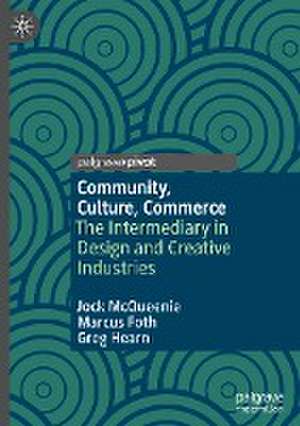Community, Culture, Commerce: The Intermediary in Design and Creative Industries
Autor Jock McQueenie, Marcus Foth, Greg Hearnen Limba Engleză Hardback – 14 dec 2023
Preț: 319.59 lei
Nou
Puncte Express: 479
Preț estimativ în valută:
61.15€ • 64.02$ • 50.60£
61.15€ • 64.02$ • 50.60£
Carte tipărită la comandă
Livrare economică 05-19 aprilie
Preluare comenzi: 021 569.72.76
Specificații
ISBN-13: 9789819978885
ISBN-10: 9819978882
Pagini: 152
Ilustrații: XXV, 152 p. 20 illus., 18 illus. in color.
Dimensiuni: 148 x 210 mm
Greutate: 0.37 kg
Ediția:1st ed. 2024
Editura: Springer Nature Singapore
Colecția Palgrave Macmillan
Locul publicării:Singapore, Singapore
ISBN-10: 9819978882
Pagini: 152
Ilustrații: XXV, 152 p. 20 illus., 18 illus. in color.
Dimensiuni: 148 x 210 mm
Greutate: 0.37 kg
Ediția:1st ed. 2024
Editura: Springer Nature Singapore
Colecția Palgrave Macmillan
Locul publicării:Singapore, Singapore
Cuprins
1 Processes of intermediation – a conceptual inventory.- 2 A genealogy of intermediaries: who do they think they are?.- 3 North West Digital Stories: A regional case in the disability sector.- 4 BeefLegends: Connecting food producers and consumers across borders.- 5 Lessons learnt for intermediation praxis.- 6 The role of the intermediary in design.- 7 Intermediaries in the future: collaborations in theory and practice.- 8 Where to from here: charting new opportunities.
Notă biografică
John “Jock” McQueenie brings creativity to social inclusion and corporate social investment. As a professional intermediary, Jock has been brokering unconventional partnerships by designing and implementing 3Cs projects for over 20 years in a wide range of sectors, industries and regions throughout Australia and Aotearoa/NZ. His two most recent projects were designed as part of a Professional Doctorate (Doctor of Creative Industries) at Queensland University of Technology, Brisbane, Australia.
Marcus Foth is a Professor of Urban Informatics in the School of Design, Queensland University of Technology. For more than two decades, Marcus has led ubiquitous computing and design research into interactive digital media, screen, mobile and smart city applications. Marcus founded the Urban Informatics Research Lab in 2006 and the QUT Design Lab in 2016.
Greg Hearn is a Research Professor in the School of Design at QUT. His research examines social, business and future workforce issues in the adoption of innovation. He is a lead researcher in the Advanced Robotics for Manufacturing Hub and a Chief Investigator in the ARC Training Centre for Collaborative Robotics in Advanced Manufacturing.
Marcus Foth is a Professor of Urban Informatics in the School of Design, Queensland University of Technology. For more than two decades, Marcus has led ubiquitous computing and design research into interactive digital media, screen, mobile and smart city applications. Marcus founded the Urban Informatics Research Lab in 2006 and the QUT Design Lab in 2016.
Greg Hearn is a Research Professor in the School of Design at QUT. His research examines social, business and future workforce issues in the adoption of innovation. He is a lead researcher in the Advanced Robotics for Manufacturing Hub and a Chief Investigator in the ARC Training Centre for Collaborative Robotics in Advanced Manufacturing.
Textul de pe ultima copertă
As digital environments become increasingly individualised, instant, ubiquitous, and disintermediated, this book demonstrates the continuing relevance of intermediaries at the intersection of design, creativity, community engagement, and corporate social responsibility. The authors examine intermediaries as enablers of mutual benefit and offer a proactive, interventionist, and holistic approach to intermediation practice that steps beyond design thinking. By means of case studies that employ the 3C project design methodology—Community, Culture, Commerce—the authors provide an accessible introduction to intermediation at the nexus of theory and practice and signpost new opportunities for researchers and practitioners in the post-COVID environment.Dr John “Jock” McQueenie brings creativity to social inclusion and corporate social investment. As a professional intermediary, Jock has been brokering unconventional partnerships by designing and implementing 3Cs projects for over 20years in a wide range of sectors, industries and regions throughout Australia and Aotearoa/NZ. His two most recent projects were designed as part of a Professional Doctorate (Doctor of Creative Industries) at Queensland University of Technology, Brisbane, Australia.
Marcus Foth is a Professor of Urban Informatics in the School of Design, Queensland University of Technology. For more than two decades, Marcus has led ubiquitous computing and design research into interactive digital media, screen, mobile and smart city applications. Marcus founded the Urban Informatics Research Lab in 2006 and the QUT Design Lab in 2016.
Greg Hearn is a Research Professor in the School of Design at QUT. His research examines social, business and future workforce issues in the adoption of innovation. He is a lead researcher in the Advanced Robotics for Manufacturing Hub and a Chief Investigator in the ARC Training Centre for Collaborative Robotics in Advanced Manufacturing.
Marcus Foth is a Professor of Urban Informatics in the School of Design, Queensland University of Technology. For more than two decades, Marcus has led ubiquitous computing and design research into interactive digital media, screen, mobile and smart city applications. Marcus founded the Urban Informatics Research Lab in 2006 and the QUT Design Lab in 2016.
Greg Hearn is a Research Professor in the School of Design at QUT. His research examines social, business and future workforce issues in the adoption of innovation. He is a lead researcher in the Advanced Robotics for Manufacturing Hub and a Chief Investigator in the ARC Training Centre for Collaborative Robotics in Advanced Manufacturing.
Caracteristici
Presents intermediary practices in an accessible format using applied examples and case studies from real world contexts Identifies and responds to limitations in project design with new collaborations across Community Culture and Commerce Challenges traditional approaches to Corporate Social Responsibility with academic rigour and praxis reflections
